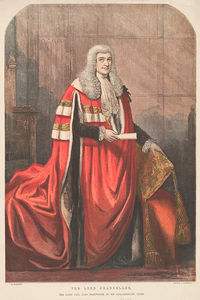Robert Rolfe, 1st Baron Cranworth
| The Right Honourable The Lord Cranworth PC |
|
|---|---|
 |
|
| Lord High Chancellor of Great Britain | |
| In office 28 December 1852 – 21 February 1858 |
|
| Monarch | Victoria |
| Prime Minister | The Earl of Aberdeen The Viscount Palmerston |
| Preceded by | The Lord St Leonards |
| Succeeded by | The Lord Chelmsford |
| In office 7 July 1865 – 26 June 1866 |
|
| Monarch | Victoria |
| Prime Minister | The Viscount Palmerston The Earl Russell |
| Preceded by | The Lord Westbury |
| Succeeded by | The Lord Chelmsford |
| Personal details | |
| Born | 18 December 1790 Cranworth, Norfolk |
| Died | Script error: The function "death_date_and_age" does not exist. Holwood House Keston, Kent United Kingdom |
| Nationality | British |
| Political party | Liberal |
| Alma mater | Trinity College, Cambridge |
Robert Monsey Rolfe, 1st Baron Cranworth PC (18 December 1790 – 26 July 1868) was a British lawyer and Liberal politician. He twice served as Lord High Chancellor of Great Britain.
Contents
Background and education
Born at Cranworth, Norfolk, he was the elder son of the Reverend Edmund Rolfe and Jemima Alexander, James Alexander, 1st Earl of Caledon's niece and a granddaughter of physician Messenger Monsey.[note 1] Rolfe was related to Admiral Lord Horatio Nelson,[2] he was educated at Bury St Edmunds, Winchester, Trinity College, Cambridge, Downing College, Cambridge (of which he was elected fellow) [3] and was called to the bar, Lincoln's Inn, in 1816.[4]
Legal and political career
Cranworth represented Penryn and Falmouth in Parliament from 1832 until he was appointed a Baron of the Exchequer in 1839. In 1850 he was appointed a Vice-Chancellor and raised to the peerage as Baron Cranworth, of Cranworth in the County of Norfolk. In 1852 Lord Cranworth became Lord Chancellor in Lord Aberdeen's coalition ministry. He continued to hold the chancellorship also in the administration of Lord Palmerston until the latter's resignation in 1858. Cranworth was not reappointed when Palmerston returned to office in 1859, but on the retirement of Lord Westbury in 1865 he accepted the office for a second time, and held it till the fall of the Russell administration in 1866.
Personal life
In 1850 he married Laura Carr (1807–1868),daughter of Thomas William Carr (b. 1770). The couple had no children.
Lord Cranworth died at his seat, Holwood House on 26 July 1868, aged 77 after a short illness related to the heat.[5] He was childless and the title became extinct on his death.
Cases
- Fouldes v. Willoughby (1841)
- Jones v Lock (1865)
- Rylands v. Fletcher judgment given 9 days before his death.
References
- ↑ "Maryland State Archives, Reference, MSA SC 4885-1-27"
- ↑ "East Anglian Worthies", by John Lucius Smith-Dampier, published by B. Blackwell, 1949, p .165.
- ↑ http://histfam.familysearch.org/getperson.php?personID=I104362&tree=Nixon
- ↑ Lua error in package.lua at line 80: module 'strict' not found.
- ↑ http://archive.spectator.co.uk/article/1st-august-1868/2/lord-cranworth-the-last-liberal-lord-chancellor-di
 This article incorporates text from a publication now in the public domain: Lua error in package.lua at line 80: module 'strict' not found.
This article incorporates text from a publication now in the public domain: Lua error in package.lua at line 80: module 'strict' not found.- Leigh Rayment's Peerage Pages [self-published source][better source needed]
- Leigh Rayment's Historical List of MPs [self-published source][better source needed]
Notes
- ↑ Monsey was chief medical adviser to the whigs and a friend of Daniel Dulany the Younger.[1]
External links
- Hansard 1803–2005: contributions in Parliament by Robert Rolfe
- Portraits of Robert Monsey Rolfe, Baron Cranworth at the National Portrait Gallery, London
| Parliament of the United Kingdom | ||
|---|---|---|
| New constituency | Member of Parliament for Penryn and Falmouth 1832–1840 With: Lord Tullamore 1832–1835 James William Freshfield 1835–1840 |
Succeeded by Edward John Hutchins James William Freshfield |
| Legal offices | ||
| Preceded by | Solicitor General 1834 |
Succeeded by Sir William Follett |
| Preceded by | Solicitor General 1835–1839 |
Succeeded by Sir Thomas Wilde |
| Preceded by | Vice-Chancellor 1850 - 1851 |
Succeeded by Sir George James Turner |
| Political offices | ||
| Preceded by | Lord Chancellor 1852–1858 |
Succeeded by The Lord Chelmsford |
| Preceded by | Lord Chancellor 1865–1866 |
Succeeded by The Lord Chelmsford |
| Peerage of the United Kingdom | ||
| Preceded by
New Creation
|
Baron Cranworth 1850–1868 |
Succeeded by Extinct |
- Birth-date transclusions with invalid parameters
- Wikipedia articles incorporating a citation from the 1911 Encyclopaedia Britannica with no article parameter
- Accuracy disputes from February 2012
- Articles lacking reliable references from February 2012
- Wikipedia articles incorporating an LRPP template without an unnamed parameter
- Accuracy disputes from March 2012
- Articles lacking reliable references from March 2012
- Wikipedia articles incorporating an LRPP-MP template without an unnamed parameter
- Lord Chancellors of Great Britain
- Members of the Parliament of the United Kingdom for constituencies in Cornwall
- Barons in the Peerage of the United Kingdom
- UK MPs 1832–35
- UK MPs 1835–37
- UK MPs 1837–41
- 1790 births
- 1868 deaths
- Barons of the Exchequer
- Solicitors General for England and Wales
